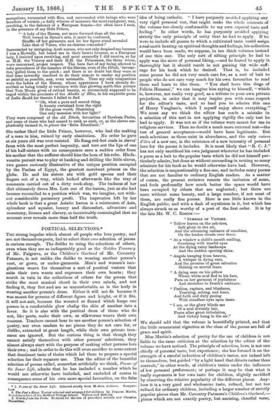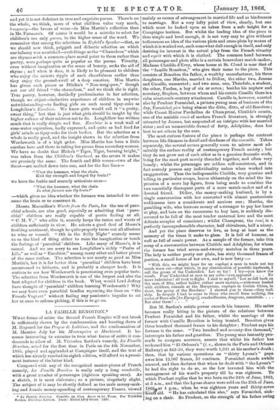POETICAL SELECTIONS.*
THE strong impulse which almost all people who love poetry, and are not themselves poets, feel to select their own selection of poems is curious enough. The dislike to using the selections of others, even when they are as indisputably good as the Golden Treasury of Mr. Palgrave, or the Children's Garland of Mr. Coventry Patmore, is not unlike.the dislike to wearing another person's coat, or gown, or under-garments. Men's and women's ima- ginations weave for themselves a sort of poetical vesture that suits their own wants and expresses their own hearts ; they search in vain in the collections of others for the poems that strike the most musical chord in their own minds, and not finding it, they fret and are as uncomfortable as is the body in wearing another person's dress. Either it will not fit because it was meant for persons of different figure and height, or if it fits, it will not suit, because the worsted or flannel which keeps one person in a comfortable glow chafe,q the skin of another into a fever. So it is also with the poetical dress of those who do not, like poets, make their own, as silkworms weave their own cocoons. Teachers cannot bear to use another person's selection of poetry, nor even readers to see pieces they do not care for, or dislike, extracted at great length, while their own private trea- sures are ignored. But the curious thing is that though they cannot satisfy themselves with other persons' selections, they almost always start with the purpose of making other persons love their own ; and in order to do this will even sacrifice to some extent that dominant taste of theirs which led them to prepare a special selection for their separate use. Thus the editor of the beautiful selection of poems called, somewhat artificially we think, Poems of the Inner Life, admits that he has included a number which he would not otherwise have included, and excluded of course in consequence some of his own more special favourites, on the false
• 1. Poems of the Inner Life. Selected chiefly from Modern Authors. Sampson Low.
2. The Poets Hour. Poetry selected and arranged for children by Frances Martin, Superintendent of the Bedford College School. Walton and Mab,riy. & Wordsl om the Poets. Selected for the use of parochial schools and libraries. Macmillan. idea of being catholic. " I have purposely avoided applying any very rigid personal test, that might make the whole contents of the volume too closely conformable to my own especial taste and feeling." In other words, he has purposely avoided applying strictly the only principle of unity that he had to apply. If he were to include all poems to which a cultivated taste could assign a real merit bearing on spiritual thoughts and feelings, his collection. would have been made, we suppose, in ten thick volumes instead of one thin one. The only sort of sifting principle he had to apply was the sieve of personal liking,—and he feared to apply it thoroughly lest it should result in not gaining the wide suff- rage for his book which he desired. That is, he included some poems he did not very much care for, as a sort of bait to people who do not care very much for his own favourites to read them and learn to like them. " You shall have this dirge of Felicia Hemans'," we can imagine him saying to himself, " which. is, however, not really very good, as a tribute to your own private prejudices, in order that it may inspire you with some respect for the editor's taste, and so lead you, to admire this one of Henry Vaughan's, which I myself enjoy above everything." We must say we think the editor has made a mistake in a selection of this sort in not applying rigidly the only test he had to apply. It was not as if the volume were meant for use in religious services. Then no doubt a much more external test—the test of general acceptance—would have been legitimate. But such selections as these exist in abundance, and the only raison d'être of a new one, is the existence of a new intensity of personal love for the poems it includes. It is most likely that "R. C. J." has not only sacrificed his own judgment wherever he has included a poem as a bait to the popular taste which he did not himself par- ticularly admire, but done so without succeeding in netting so many admirers for his book as he would otherwise have had. However,. the selection is unquestionably a fine one, and includes many poems that are not familiar to ordinary English readers. As a matter of course, the present reviewer resents the inclusion of some, and feels profoundly how much better the space would have been occupied by others that are neglected ; but there are none without some beauty, and a large number, if not most of them, are really fine poems. Here is one little known to the English public, and with a dash of mysticism in it, but which has always struck us as worthy of a poet of the first order. It is by the late Mr. W. C. Roscoe :— " SYMBOLS OF VICTORY.
" Yellow leaves on the ash-tree, Soft glory in the air, And the streaming radiance of sunshine, On the leaden clouds over there.
" At a window a child's mouth smiling, Overhung with tearful eyes At the flying rainy landscape
And the sudden opening skies.
" Angels hanging from heaven, A whisper in dying ears, And the promise of great salvation Shining on mortal fears.
" A dying man on his pillow Whose white soul fled to his face, Pats on her garment of joyfulness And stretches to Death's embrace.
" Petition, rapture, and blindness, Yearning, aching, and fears, And faith and duty gazing With steadfast eyes upon tears.
" I see, or the glory blinds me Of a soul divinely fair,
Peace after great tribulation, And victory hung in the air."
We should add that the volume is beautifully printed, and that the little ornamental vignettes at the close of the poems are full of grace and spirit.
Miss Martin's selection of poetry for the use of children is not liable to the same criticism as the selection by the editor of the volume we have noticed. The principle of selection, here, is not one chiefly of personal taste, but experience ; she has formed it on the strength of a careful induction of children's tastes, not indeed left to themselves, but guided " by a light hand that directs rather than controls," in other words, of children's tastes under the influence
of her personal preferences ; or perhaps it may be that what it really represents is her own taste for children, slightly modified by observing the relative popularity of the different pieces. Any-
how it is a very good and wholesome taste, refined, but not too refined for ordinary children, including a larger number of strictly
popular pieces than Mr. Coventry Patmore's Children's Garland,— pieces which are not exactly poetry, but amusing, cheerful verse,
and yet it is not deficient in true and exquisite poems. There is on the whole, we think, more of what children value very much, .buoyancy—the breeze of verse—in Miss Martin's collection than in Mr. Patmore's. Of course it would be a mistake to select for children's use only poems, in the higher sense of the word. We remember that among the selections in Enfield's Speaker—that, as we should now think, priggish and didactic selection on which our infancy was nourished—such things as the "Chameleon" which are rhymes evith a common-place moral point to them rather than poetry, were perhaps quite as popular as the poems. Vivacity, even without imagination or the sense of beauty, seeks the aid of rhyme ; an1 when it does, it is likely to be pleasant to children who enjoy the minute ripple of such cheerfulness earlier than they enjoy the ground-swell of a deep emotion. Miss Martin has given such pieces as Dibdiu's " Non-tong-paw," though not our old friend "the chameleon," and we think she is right. True poetry, however, decidedly predominates in her selection, though we object—inductive experience of children in anywise notwithstanding—to reeding girls on such moral tipsy-cake as Longfellow's Excelsior. We know girls would call it "a pretty, sweet thing," 'but that is just what girls should be taught by the higher eulture of their mistress not to do. Longfellow has written much that is really simple and fine. Excelsior is a weak wail of rose-water aspiration, badly expressed, and quite as bad food for girls' minds as tipsy-cake for their bodies. But the selection as a whole is really good, and the insight shown in the selection from Wordsworth is of a high order. Miss Martin has been a little careless here and there in taking her poems from secondary sources. We have no doubt that Blake's " Tiger, Tiger, burning bright," was taken from the Children's Garland, as the errors it makes are precisely the same. The fourth and fifth verses—two of the finest—are melted down into one, and for the fine lines —
" What the hammer, what the chain,
Knit thy strength and forged thy brain?"
'we have the feeble and scarcely articulate ones- " What the hammer, what the chain in what furnace was thy brain?"
—which gives no idea whether the furnace was intended to con- sume the brain or to construct it.
Messrs. Macmillan's Words from the Poets, for the use of paro- chial schools, are also good, especially as admitting that ' paro- chial' children are really capable of poetic feeling at all. 4 4 C. M. V.," who edits it, scarcely keeps the tastes and wants of children sufficiently in view. He selects a good deal of Moore's frothing sentiment, though he quite properly turns out all allusions to wine or wassail. " Oft in the Stilly Night" scarcely seems to us the kind of thing either to raise the imagination or touch the feelings of parochial' children. Like many of Moore's, it is unreal. And we are sorry to see Longfellow's sickly "Psalm of Life," as well as " Excelsior," among many other and better pieces of the same author. The selection is not nearly as good as Miss Martin's, but it is far better than 'parochial' children have been accustomed to hitherto, and is probably a cheaper book. It is curious to see how Wordsworth is penetrating even popular taste. The selection from Wordsworth is one of the largest and also the best adapted for children in the book. What. would Lord Jeffrey have thought of ' parochial ' children learning Wordsworth ? Why we may have even parochial beadles repeating the lines on "the Female Vagrant" without feeling any passionate impulse to set her at once to oakum-picking, if this is to go on.































 Previous page
Previous page